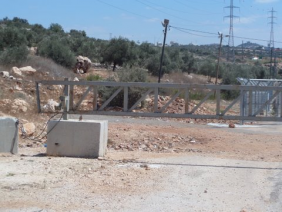'Azzun, Eliyahu Crossing, Habla, Jayyus

10:15 Eliyahu Crossing. Traffic flwoing, no delays.
10:20 Azzun: A military jeep at the entrance, as usual.
We visited Z's shop, to unload the stuff we brought. Z tells us that Israel stole his family's lands 30 years ago, leaving them landless.
That's where the Alfey Menashe settlement was built. His extended family still lives there.
At the Azzun municipality we meet the administrator H. He announces: Nothing good happens under the occupation!
Azzun East: H repeats his years-old request that the eastern blockage on the raod between 'Azzun and Maale Shomron be removed, to allow them access to their lans across the road. Till now they could get there on foot, but now a new high iron fence has been erected. His family and twenty others who have 300 acres there have no choice but to access them by vehicles, a much longer way (route 55).


Before the separation wall and ths settlements, the residents of 'Azzun had 24,000 acres. Now they can access only 11,000 of them. 13,000 were stolen by the occupier. Once they had herds. All were eliminated for lack of grazing land. Maale Shomron was built on the lands of Azzum and Kufer Tolath, and now there are apparently plans to expand it. H shows us plans and orders he received some days ago. A lawyer from Qalqilya is taking care the matters.
H also shows us a document requesting permission to fortify the existing fence surrounding Maale Shomraon, and asking for the consent of the 'Azzun municipality. He does not understand the demand from 'Azzun, but hypothesizes that it is a way of legalizing the illegal fence. This, too, is under the care of a lawyer.
Olive harvesting -- people requesting permits to access their trees are summoned to the PA offices in Qalqilya to fill out forms. Permits are due in late September. Last year a group of hiking settlers, equipped with weapons, arrived in H's lot during the harvest. They asked him: What are you doing here? These are my lands and my olives, he replied. He claims they came to still sacks of olives, a coomon practice among the "lords of the land".
On Friday 9.8.14 during a wartime protest, in the west of Azzun, far from any village or road, the army shot into a crowd. Two bullets hit a young protester, who was severely wounded and is now paralyzed. The finger is so light on the trigger. Doesn't the shooting soldier know how to shoot into the air?
Two days ago soldiers arrived at 2am at the home of a family in town, and arrested a 17-year old. The father of the family is deceased. They forced the mother to sign the Hebrew documents with her finger print. She has no idea what she signed. To save her son whe complied with the soldiers demand. The son was taken to Kishon jail, and is still there.
The army enters 'Azzun nightly. Last month they trained "live" -- the commander demonstrated how to apprehend suspects. For that purpose they entered homes, arrested Palestinians, handcuffed their hands behind their backs, and lay them on the ground. Thus the IDF teaches its soldiers to handle civilians.
Prior to 1948 Arabs and Jews lived together amicably. This is the goal, he says. There is no room here for two states. It is possible. And what about the settlements, we ask. They must be removed from all the confiscated lands. The lands must be returned to their rightful owners.
Israel is doing all it can to start another intifada. The Palestinians, wisely, are not letting themselves be dragged into it.
There is a new enterprise in the municipality on mattetrs of schooling and educaton. In 'Azzun girls are better students than boys (because, he believes, they spend more time at home with their mothers). Many of the students have problems at home, and there isn't good contact between parents and school. They are trying a new idea to strengthen weak students.
We part from H, although his stories have not ended.
12:30, Jayyus. We tried to meet with the Ecumenicals to get some news from them. In a phone call with K we hear that they are in Shufa, because the IDF has reinstated the blockage that was removed some time ago. We agreed to get the news in writing because the connection was poor.
In the Jayyus municipality there is nobody at this hour who speaks either Hebrew or English. We look at the wide spaces and see the new fence being erected as a result of the high court's decision to return some lands to their Jayus owners -- 2500 acres. But 6000 more will be on the other side of the fence. B tries to explain the problematic location of the gate in the new fence. If the gate in north Jayyus will be eliminated, the new gate will hurt the many farmers whose lands will remain on its other side. To access them they will have to enter through a faraway gate and return towards Jayyus. We take the phone number of the council chairman, and will attempt to make an appointment with him soon.
13:00 Leaving 'Azzun the jeep is still there, doors ajar, and a soldier standing beside it.
We reach Eliyahu's Crossing. We go through the routine of showing documents, opening the luggage compartment, answering questions, etc. There are no cars in the parking lot. Traffic is flowing.
13:45 Habla. Quiet. All arrivals pass quickly. The pump house is closed. The old pump is still working.
We do some shopping in Omar's nursery, and develop a conversation with this nice intelligent young man. He does not understand the Israelis. A few days ago an Israeli woman was sitting in his nursery, claiming that the IDF should have destroyed Gaza. Such depair ...
14:15. We leave
